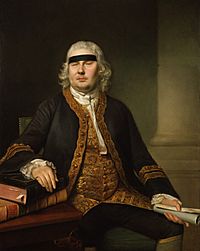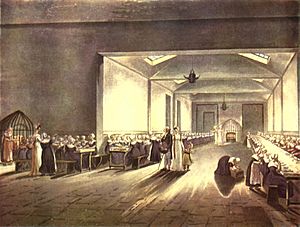John Fielding facts for kids
Quick facts for kids
Sir John Fielding
|
|
|---|---|
 |
|
| Born | 16 September 1721 |
| Died | 4 September 1780 (aged 58) |
| Nationality | English |
| Other names | Blind Beak |
| Occupation | Magistrate, social reformer |
| Relatives | Henry Fielding (half-brother) |
Sir John Fielding (born 16 September 1721 – died 4 September 1780) was an important English magistrate and social reformer in the 1700s. A magistrate is like a judge who handles smaller legal cases. He was the younger half-brother of Henry Fielding, a famous writer and also a chief magistrate. Even though John became blind at age 19, he started his own business. He also studied law with his brother Henry.
Contents
John Fielding's Early Life
John Fielding was born on 16 September 1721 in London. He was the third child of Lieutenant-General Edmund Fielding. His mother was Anne Blanchard. John had close relationships with his half-siblings, Henry Fielding and Sarah Fielding. They were from his father's first marriage.
Not much is known about John's childhood. He had poor eyesight from a young age. In 1740, when he was 19, he became completely blind. This happened during a medical treatment. The surgeon responsible had to pay John a large sum of money.
Building a Career
In 1750, John Fielding teamed up with his brother Henry. They created the University Register Office. This organization helped people connect for business deals. Over time, it became a place to find jobs. It also sold a special type of water. John lived and worked at the office, managing it.
Creating the First Police Force
John became Henry's helper in 1750. Together, they worked to make the justice system better in London. They wanted to stop unfair practices. They also aimed to improve the skills of those working in law enforcement. They formed the first professional police group. This group was called the Bow Street Runners.
John also started a regular newspaper called the police gazette. This paper shared descriptions of people who had broken the law. This was the beginning of the first police department for keeping records of lawbreakers.
The "Blind Beak"
When Henry died in 1754, John took over his role. He became the chief magistrate at Bow Street. He became very well-known as the "Blind Beak." People said he could recognize three thousand lawbreakers just by the sound of their voices.
John continued to develop his ideas for preventing crime. He also worked on helping young people find jobs. In 1758, he helped start the Asylum for Orphan Girls in Lambeth. This was a home for girls who had lost their parents. In 1761, he was honored with a knighthood. This meant he was given the title "Sir."
Images for kids
 | Emma Amos |
 | Edward Mitchell Bannister |
 | Larry D. Alexander |
 | Ernie Barnes |



